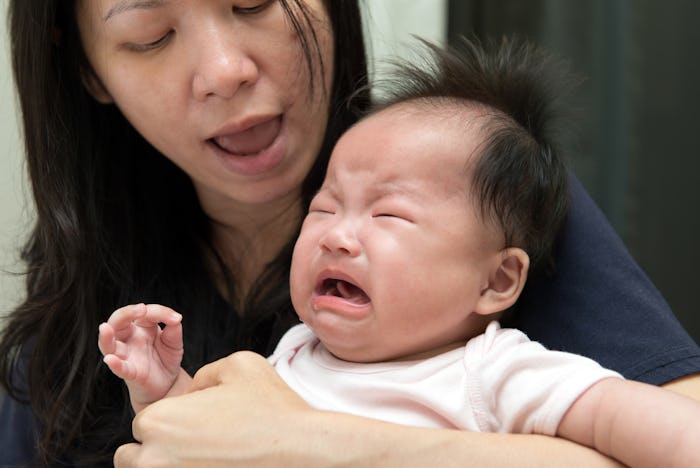Life

Why Your Baby Doesn't Like To Be Held By Certain People
Anyone that's been around a baby has seen it happen. The baby is cooing and smiling with their parent or caretaker when someone says, "Let me hold the baby." The baby is then transferred to this person, be it stranger, family member, or friend, and starts to scream. The baby's reaction can be unnerving and troubling especially if the baby always cries with the same person and not another person. You might be wondering why your baby doesn't like to be held by certain people.
When my daughter was 6-months-old, she would scream when held by an aunt on my husband's side of the family. Every time she got near this relative, my daughter would shriek. The aunt would insist on holding her anyway and, because I didn't know any better (and my husband was giving me "the look"), I would let her. Most of the time, the aunt would quickly hand her back to me or my husband when she realized that the crying wasn't going to stop. We didn't dare tell the aunt what we had observed early on — our baby didn't scream with anyone else, only her. We used to joke that the aunt must be secretly pinching her or something, but the truth is it was probably just stranger anxiety.
According to Web MD, baby stranger anxiety presents itself anytime between six and 12 months. Basically your baby now has the brain capacity to understand the difference between you and a stranger. Even though my daughter's aunt wasn't technically a stranger, my daughter only saw her maybe once every other month. In a baby's world, that is a stranger. Well-known parenting expert and author Dr. William Sears made an interesting claim in Parenting as well, suggesting that if a parent has anxiety about a certain person or stranger the baby will pick up on that and react accordingly. You are your baby's social barometer in a sense.
One other factor that could be at play here is separation anxiety. According to Baby Center, separation anxiety in babies is a completely normal developmental milestone and it shows up around 12 to 24 months old. By this point, you've formed a strong bond with your baby and they just generally prefer being with you, playing with you, and being held by you or by a friend or family member, or even caretaker that sees the baby on a very regular basis.
Thankfully there are ways to cope when your baby freaks out with other people. First and foremost, don't be embarrassed about it. It's completely natural for your baby to have this reaction and everyone involved should get it and not be offended. Baby Center explained that there things you can do to help calm your baby when this happens including: take the baby back quickly, leave the room for a few minutes, and wait until your baby is happy in your arms before handing them back over for round two. If it's a situation where your baby is crying with a caregiver, Kids Health explained that babies adapt pretty well. The site suggested that parents practice for little intervals leaving their baby with a caregiver. The site also noted that it's best to not leave a baby when they are hungry or tired as it will just escalate the situation.
It might feel awful, uncomfortable, and even emotional when your baby flat our refuses someone else's arms. Try to remember that this is a phase and it will pass. In a few years you might find yourself at my stage in life where the kids prefer not to be around parents and instead with the fun babysitter or watching a tablet.